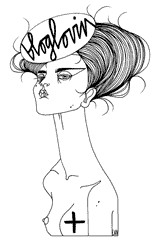Fahrenheit 451 by Ray Bradbury
17 September, 2014
We are nothing more than dust-jackets for books, of no significance otherwise.
Why, why, WHY have I not read Ray Bradbury’s most famous novel, Fahrenheit 451, earlier? But then I pause and think to myself that maybe choosing it for my book group at this particular time was fortuitous. Living in an era where we are bombarded by information, the internet, the telly, celebrity gossip, news that masquerades as serious journalism, only proves to magnify Bradbury’s frightening dystopian vision of the world where books are considered dangerous and routinely torched, along with the houses that shield them. While I grew up in a time when we didn’t have the internet or tablets or even a computer in every household, it’s horrifying to think that in 15 years, we’ve almost forgotten what it’s like to be unplugged. I go to work, read a little on my commute, come home and then just zone out watching box sets or J-dramas on the internet, available 24/7. I have all this time in the evenings and yet I feel I have no time at all. Every single day. What am I doing?
This is precisely the question Guy Montag, Bradbury’s anti-hero, begins to ask himself when three incidents occur separately but simultaneously and coalesce, acting as a catalyst to a seed which has been planted in his almost lobotomised mind. The first is his meeting with Clarisse, a free-spirited, fey neighbour who strolls around looking at and questioning things. She is the first person in years who has shown an interest in Montag, this strange, quaint, seventeen year old girl, the first to ask him, ‘Is it true that long ago firemen put fires out instead of going to start them?’ The second is finding his wife, Mildred, overdosed and watching her stomach being pumped not by doctors but by routine service men making him question the level of unhappiness in this world when doctors no longer treated suspected suicides seriously. And the third incident is when he is called out to a suspected book hoarder to be faced by a determined woman who would torch herself together with her books than live in a world without them. These three incidents shake Montag’s equilibrium, sending him on a trajectory where he begins to question and really see the world in which people no longer value knowledge.
What gives Bradbury’s short novel such power is that Montag starts off as a proud fireman, one of the supposed gatekeepers of peace and morality, a little like Torquemada, a little like Savonarola. He wears his uniform, emblazoned with Fahrenheit 451 – the temperature at which paper ignites, with pride. But as his apathy erodes, he begins to question why knowledge has become so maligned. Why are books being burned? Why are people looked upon suspiciously if they go for a stroll or engage in idle chatter or even a friendly debate? Why do the firemen have mechanical hounds who will sniff out the sudden changes in DNA and will go to great lengths to find and neutralise people with books? And his changing behaviour sparks the suspicion of his fire chief, Beatty, full of the knowledge of all the books he’s burned, ready to twist anything Montag can say.
Sedated by a diet of sound bites and recycled pop-dramas, Montag’s fellow city dwellers have no time to question their lives or the impending war that is slowly unfolding. But Montag is unable to stop himself as he begins a journey of discovery that will lead him to lose everything and go on the run. And in doing so, he encounters several people, all trying to hold on to their humanity via the books they love including a group reminiscent of the railway hobos of the 1930s.
Even though practically everything’s airborne these days and most of the tracks are abandoned, the rails are still there, rusting. I’ve heard there are still hobo camps all across the country, here and there; walking camps they call them, and if you keep walking far enough and keep an eye peeled, they say there’s lots of old Harvard degrees on the tracks beyween here and Los Angeles. Most of them are wanted and hunted in the cities.
It is almost unbelievable that Fahrenheit 451 was first published in 1953. Every single sentence is relevant to our world today. What is most frightening is that the future he predicts is already happening.
As Bradbury himself warns in a more recent preface,
It had to do with books being burned without matches or fire. Because you don’t have to burn books, do you, if the world starts to fill up with non-readers, non-learners, non-knowers? If the world widescreen basketballs and footballs itself to drown in MTV, no Beattys are needed to ignite the kerosene or hunt the reader. If the primary grades suffer meltdown and vanish through the cracks and ventilators of the school room, who, after a while, will know or care?
A frightening thought indeed.
Each page in Fahrenheit 451 is a revelation, a recognition that if we don’t realise what is important, that knowledge, studying , reading, debating anchors us to humanity, then we are lost. And more importantly, reflecting on our actions. As one character in the novel says,
We know all the damn silly things we’ve done for a thousand years, and as long as know that and always have it around where we can see it some day we’ll stop making the goddam funeral pyres and jumping into the middle of them. We pick up a few more people that remember, every generation.
Although I loved everything about this book and didn’t really find it dated considering it was written almost 60 years ago (it’s easy to substitute tv with the internet), I did find Bradbury’s portrayal of his female characters lacking in three dimensionality. They were used more as props rather that as fully realised characters, there to spur Montag on in his re-awakening. They were a tad too simple and stereotypical and may as well have been incidents rather than people. However, I have heard that the film version does flesh them out a bit.
Neverheless, Fahrenheit 451 is a powerful book with important ideas, and even though it was conceived during the McCarthy era when censorship was rife, it is still relevant in our current climate.
Do also check out Bradbury’s interview with the Paris Review.
I read this as part of R.I.P. IX.













17 September, 2014 at 1:10 pm
Excellent review and thoughts about the book. It’s been so long since I’ve read it good to refresh myself on its themes and why it’s still relevant. It’s good sometimes to leave “classics” like these till later in life when they have a different meaning and you can appreciate them more. I think it’s really good you pick up on the way he writes his female characters as well. Thanks.
18 September, 2014 at 11:43 am
There are so many books I’d meant to read and never got to when I was younger so I’m trying to catch up. However, I do wonder if their impact may be different. But I do think there are some books you don’t fully understand when you read them too early but it’s probably different for each reader.
19 September, 2014 at 10:22 am
It’s so long since I read this novel, I really ought to re-read it. Going by your appreciative thoughts, I think I’d get a lot more from it second time around – which is usually the case with all modern classics for me.
19 September, 2014 at 10:40 am
Have you seen the film version? Someone in my book group said that having watched the film many times, it certainly influenced his re-read of the book. Interesting, no?
19 September, 2014 at 11:33 am
I don’t believe I have… ! It’s always interesting to compare books and films of them – it’s always Richard Burton I remember in 1984 for instance.
19 September, 2014 at 11:56 am
Yes, although I still believe reading the book before seeing the film is a must!
19 September, 2014 at 1:43 pm
Sugoi review!! Thanks for bring this book to my attention. I’ve been wanting to re-read Philip K. Dick’s short stories which had quite an impact on me several years ago… I thought I’ve read Bradbury once before but my memory might be mistaken… I’ve just started Enjoe Toh’s ‘Perfect Days for Bananapeel’ (円城塔 ‘バナナ剥きには最適の日々’). He is deep and twisted and has humor.
19 September, 2014 at 2:41 pm
Count on you to always give me recommendations of Japanese books with such great titles! I love it. I still haven’t read anything by Philip K. Dick – my sf library is still quite small. But I do recommend Iain M. Banks!
25 September, 2014 at 8:51 pm
Great review. I read this in my teens and have somehow never revisited it, despite having loved it. I’m curious how differently I’d read it, now that I’m much more aware of what’s going on in the world. A friend has been trying to get me to read Bradbury’s Something Wicked This Way Comes so maybe I should do a Bradbury month.
26 September, 2014 at 2:58 pm
I haven’t read anything else by Bradbury but I plan to do so too. Something Wicked This Way Comes sounds good!
29 September, 2014 at 10:49 pm
Great post! I learned a couple years ago that a local university here is home to a “Center for Ray Bradbury Studies” whose director knew RB personally and is also one of his biographers. I posted about his visit to a book club I attend at http://bibliophilica.wordpress.com/2012/09/28/banned-books-week-fahrenheit-451-by-ray-bradbury/ if you’d like to read. I learned a lot about RB and F 451 that I hadn’t heard of before.
1 October, 2014 at 11:28 am
Such an interesting post Jay – thanks for letting me know.